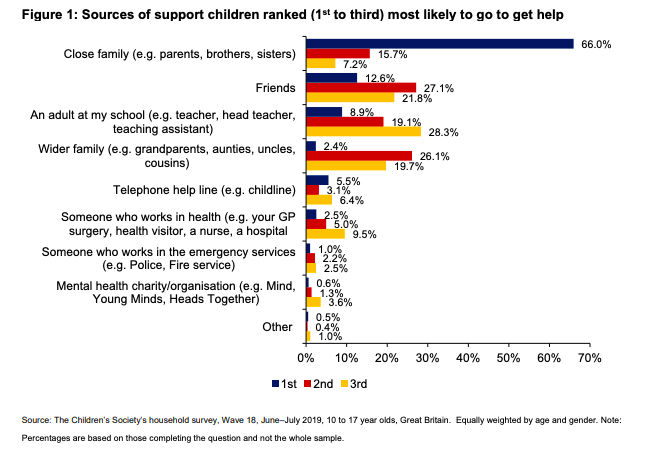Home » Articles & News » Reaching Out: The Children’s Society Report on Young People’s View Of Mental Health Support

The Children’s Society have launched their review of young people’s views on mental health support. The report’s aim is to better understand where children would go for help if they had concerns about their feelings or behaviours.
The researchers worked with a small group of young people to set questions which were then added to The Children’s Society Annual Household Survey.
“Instead of using the phrase ‘mental health’, they told us they would be happier being asked about their ‘feelings and behaviour’. While this may not align with formal definitions of mental ill-health, it ensured that the information collected focussed on feelings and behaviours that were of concern to children themselves”.

Key Findings
- Children most frequently rated close family as the source they were most likely to go to get help if they were worried about their feelings or behaviour.
- Almost nine in ten children chose their parents/siblings as one of their three most likely sources of help, with formal sources of support being picked much less frequently.
- Over half (58%) of children indicated they had worries about their feelings and behaviour and had sought help from one or more sources.
- There were some statistically significant differences in both the types of support obtained and the proportion of children who sought help based on their characteristics. For example, girls were significantly more likely to seek help, and boys to say they had no concerns.
- Over 8% of children indicated that they had worries about their feelings or behaviour but had not sought help. Applying this proportion to population estimates for 10-17 year olds, we estimate that over 464,000 children of this age in Great Britain may have worries about their feelings and behaviour but have not sought help.
- When asked to indicate on a scale of 0 to 10 how happy they were overall with the support they received (where 0 is not happy at all and 10 is very happy), 88% of children gave a score above the midpoint (i.e. between 6 and 10 out of 10) suggesting a generally positive experience.
- Further research is required to understand what makes children feel both happy and unhappy with the support they receive, and how this can be translated into support services.
Recommendations
- The findings highlight that parents and other family members are an important source of support for children and young people. Local Public Health officials must prioritise work with parents in their local area to communicate key messages about how to support children’s mental health.
- The majority of parents and carers prefer to seek help from their GP when they have a concern about their child’s mental health. CCGs and GP surgeries should consult with parents and with children and young people to identify the strengths and weaknesses of GP support on offer in their area and respond accordingly.
- More mental health support needs to be made available in local communities. We recommend that open access community services are made available to ensure that all young people can have timely access to low level mental health support.
- Local partners should work together, across the local authority, CCG and with wider organisations to ensure that youth workers, sports coaches, uniformed group leaders, faith and community leaders are all properly trained in mental health first aid for children and young people.
- It is important that children in need of support are identified in an un-stigmatising and unobtrusive way. We recommend national measurement of children’s subjective wellbeing should be introduced.
Tagged in: mental health, youth employment challenges
Discover Youth Friendly Employers
 ABP Foods
ABP Foods
 Apprenticeships, graduate schemes and an AMAZING early careers academy in the world of sustainable food
EXPLORE
Apprenticeships, graduate schemes and an AMAZING early careers academy in the world of sustainable food
EXPLORE
 Careers in Eyecare
Careers in Eyecare
 From healthcare lab to high street fashion - you don't need a degree to open your eyes to eyecare careers
EXPLORE
From healthcare lab to high street fashion - you don't need a degree to open your eyes to eyecare careers
EXPLORE
 Aspiration Training
Aspiration Training
 Traineeships & Apprenticeships in childcare, dental nursing, teaching, health/social care, and business admin
EXPLORE
Traineeships & Apprenticeships in childcare, dental nursing, teaching, health/social care, and business admin
EXPLORE
 Careers in Racing
Careers in Racing
 Horse racing is a great career choice! British Racing is the 2nd largest spectator sport after football.
EXPLORE
Horse racing is a great career choice! British Racing is the 2nd largest spectator sport after football.
EXPLORE
 Catch22 Youth Services
Catch22 Youth Services
 Want to overcome barriers in life, whatever your background? Want employers to give you a chance? We can help.
EXPLORE
Want to overcome barriers in life, whatever your background? Want employers to give you a chance? We can help.
EXPLORE
 Coach Core Apprenticeships
Coach Core Apprenticeships
 See how Coach Core Apprenticeships get you into sport careers
EXPLORE
See how Coach Core Apprenticeships get you into sport careers
EXPLORE
 Coca-Cola EuroPacific
Coca-Cola EuroPacific
 Want to work for one of the most well-known brands in the world? They work hard to develop their young people!
EXPLORE
Want to work for one of the most well-known brands in the world? They work hard to develop their young people!
EXPLORE
 Environment Agency Careers
Environment Agency Careers
 Our work helps to protect and improve the environment to make it a better place for people and wildlife. Join us!
EXPLORE
Our work helps to protect and improve the environment to make it a better place for people and wildlife. Join us!
EXPLORE
 Essex Youth Service
Essex Youth Service
 Aged 13-25 and live in Essex? Get involved in fun activities, The Duke of Edinburgh's Award and online Plan B Traineeships.
EXPLORE
Aged 13-25 and live in Essex? Get involved in fun activities, The Duke of Edinburgh's Award and online Plan B Traineeships.
EXPLORE
 Generation: Free Skills Training
Generation: Free Skills Training
 Get FREE skills and careers training today! Generation gives you skills and connects you with employers to find a job fast.
EXPLORE
Get FREE skills and careers training today! Generation gives you skills and connects you with employers to find a job fast.
EXPLORE
 Get Into Teaching
Get Into Teaching
 You can get a teaching degree for FREE with apprenticeships!
EXPLORE
You can get a teaching degree for FREE with apprenticeships!
EXPLORE
 Heidelberg Materials
Heidelberg Materials
 Play to your strengths. Travel the world - if you want to. Work with people, money, sales, or technical skills!
EXPLORE
Play to your strengths. Travel the world - if you want to. Work with people, money, sales, or technical skills!
EXPLORE
 Haven
Haven
 Joining Haven is more than just a job. Our early careers are a breath of fresh air!
EXPLORE
Joining Haven is more than just a job. Our early careers are a breath of fresh air!
EXPLORE
 Historic England
Historic England
 Discover early careers in heritage for all backgrounds, skills and interests.
EXPLORE
Discover early careers in heritage for all backgrounds, skills and interests.
EXPLORE
 IHG Early Careers
IHG Early Careers
 Discover how you can grow your career in hospitality!
EXPLORE
Discover how you can grow your career in hospitality!
EXPLORE
 Working in local government
Working in local government
 Local government touches everyone's lives every day
EXPLORE
Local government touches everyone's lives every day
EXPLORE
 Martin Brower Careers
Martin Brower Careers
 Break into business, admin and supply careers with Martin Brower. Don't settle for the status quo.
EXPLORE
Break into business, admin and supply careers with Martin Brower. Don't settle for the status quo.
EXPLORE
 McDonald's Early Careers
McDonald's Early Careers
 You probably knew you can get McDonald's Apprenticeships. Did you know you can also study for a FREE Management Degree?
EXPLORE
You probably knew you can get McDonald's Apprenticeships. Did you know you can also study for a FREE Management Degree?
EXPLORE
 NCFE Vocational Qualifications
NCFE Vocational Qualifications
 Young people get amazing perks when they work for the NCFE, with apprenticeships and more. The training is great, too.
EXPLORE
Young people get amazing perks when they work for the NCFE, with apprenticeships and more. The training is great, too.
EXPLORE
 Pret Apprenticeships & Careers
Pret Apprenticeships & Careers
 When you apply for a Pret Apprenticeship or junior role, you’ll belong to a community of achievers. Get support on your own unique career journey!
EXPLORE
When you apply for a Pret Apprenticeship or junior role, you’ll belong to a community of achievers. Get support on your own unique career journey!
EXPLORE
 Prezzo Restaurant Careers
Prezzo Restaurant Careers
 Prezzo offers so many early careers, from cooking great food and giving great customer service to managing like a boss!
EXPLORE
Prezzo offers so many early careers, from cooking great food and giving great customer service to managing like a boss!
EXPLORE
 Red Carnation Hotels
Red Carnation Hotels
 Have fun at work with internships, degree apprenticeships and management schemes when you join Red Carnation Hotels.
EXPLORE
Have fun at work with internships, degree apprenticeships and management schemes when you join Red Carnation Hotels.
EXPLORE
 Royal Air Force
Royal Air Force
 There’s nothing like a career in the RAF, it’s not just a job but a way of living.
EXPLORE
There’s nothing like a career in the RAF, it’s not just a job but a way of living.
EXPLORE
 Severn Trent Careers
Severn Trent Careers
 Discover opportunities for apprentices, graduates and undergraduates in the office and beyond!
EXPLORE
Discover opportunities for apprentices, graduates and undergraduates in the office and beyond!
EXPLORE
 Sodexo
Sodexo
 Come and EXPLORE your career at Sodexo. See what amazing opportunities come about along the way.
EXPLORE
Come and EXPLORE your career at Sodexo. See what amazing opportunities come about along the way.
EXPLORE
 Surrey County Council Careers
Surrey County Council Careers
 Thinking about rewarding apprenticeships and early careers in a diverse environment? Fire up your career with SCC!
EXPLORE
Thinking about rewarding apprenticeships and early careers in a diverse environment? Fire up your career with SCC!
EXPLORE
 Taylor & Francis Early Careers
Taylor & Francis Early Careers
 Our international publishing company believes in doing things differently. You could be just what we need!
EXPLORE
Our international publishing company believes in doing things differently. You could be just what we need!
EXPLORE
 The British Library
The British Library
 Work experience, internships and apprenticeships with The British Library open up a WORLD of possibilities.
EXPLORE
Work experience, internships and apprenticeships with The British Library open up a WORLD of possibilities.
EXPLORE
 VHR Technical Recruitment
VHR Technical Recruitment
 The VHR talent academy can help you get into a successful technical recruitment career - with NO experience!
EXPLORE
The VHR talent academy can help you get into a successful technical recruitment career - with NO experience!
EXPLORE
Email us at info@youthemployment.org.uk or call 01536 513388.
As experts on youth employment and co-founders of the Youth Employment Group, we are ideally placed to understand the complex landscape facing young people, employers and policy makers.









